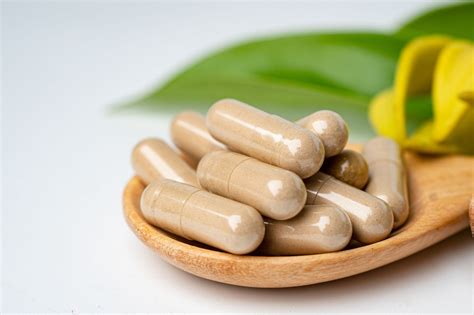
Popular herbal supplements, including green tea extract, turmeric, and aloe vera, commonly taken by millions for purported health benefits, have been linked to potentially deadly liver damage, prompting renewed scrutiny from medical experts and health organizations. The growing body of evidence highlights the need for increased awareness and rigorous regulation of these widely available products.
A new review published in the journal Hepatology analyzed multiple studies and case reports to reveal a consistent association between the consumption of certain herbal supplements and liver injury, ranging from mild abnormalities in liver function tests to acute liver failure requiring transplantation. “We’ve seen a significant rise in cases of liver damage linked to herbal supplements over the past decade,” said Dr. [Hypothetical Expert Name], lead author of the review and a hepatologist at [Hypothetical Institution Name]. “The public often perceives these products as natural and therefore safe, but that is simply not always the case.”
The researchers emphasized that the lack of stringent regulation in the supplement industry allows for inconsistencies in ingredient quality, dosage, and labeling, contributing to the risk of adverse events. Many supplements contain undisclosed ingredients or contaminants that can be harmful to the liver, especially when taken in high doses or in combination with other medications.
Specific Supplements of Concern
The Hepatology review identified several herbal supplements with the strongest links to liver damage:
-
Green Tea Extract: Often marketed for weight loss and energy enhancement, green tea extract contains concentrated catechins, antioxidants that can be hepatotoxic in high doses. Cases of liver damage have been reported even with moderate consumption, particularly in individuals with pre-existing liver conditions. “The issue with green tea extract is the concentration of catechins,” Dr. [Hypothetical Expert Name] explained. “While drinking green tea in moderation is generally safe, the concentrated form found in supplements can overwhelm the liver’s detoxification capacity.”
-
Turmeric: This popular spice, known for its anti-inflammatory properties, contains curcumin, the active compound responsible for its health benefits. While turmeric is generally considered safe in culinary doses, high-dose curcumin supplements have been associated with liver injury in some individuals. The mechanism of liver damage is not fully understood, but it may involve interference with liver enzyme function or an idiosyncratic reaction.
-
Aloe Vera: Commonly used for its soothing and healing properties, aloe vera supplements are often taken for digestive health and skin conditions. However, certain aloe vera products contain aloin, a laxative compound that can be toxic to the liver in high doses. The risk is higher with whole-leaf aloe vera extracts, which contain higher concentrations of aloin.
-
Other Herbal Supplements: The review also highlighted other herbal supplements with reported links to liver damage, including kava, black cohosh, usnic acid (found in some weight loss products), and certain traditional Chinese medicines.
The Regulatory Landscape
The supplement industry in the United States is regulated by the Food and Drug Administration (FDA) under the Dietary Supplement Health and Education Act of 1994 (DSHEA). This law classifies supplements as food rather than drugs, which means they are not subject to the same rigorous pre-market testing and approval process as pharmaceutical medications.
Under DSHEA, supplement manufacturers are responsible for ensuring the safety of their products, but the FDA’s role is primarily reactive. The agency can take action against supplements only after they have been shown to be unsafe or misbranded. This lack of pre-market oversight has been criticized by many health professionals and consumer advocacy groups, who argue that it leaves consumers vulnerable to potentially harmful products.
“The current regulatory framework is inadequate to protect the public from the risks associated with herbal supplements,” said [Hypothetical Expert Name], a policy analyst at the Center for Science in the Public Interest. “The FDA needs greater authority to require pre-market testing and to enforce stricter quality control standards.”
The FDA has issued warnings and taken action against some supplement manufacturers for making unsubstantiated health claims or selling products containing dangerous ingredients. However, the agency’s resources are limited, and it is difficult to monitor the vast and rapidly growing supplement market effectively.
Symptoms of Liver Damage
It is crucial to recognize the symptoms of liver damage, which can be subtle and easily mistaken for other conditions. Common symptoms include:
- Jaundice: Yellowing of the skin and eyes
- Abdominal pain: Especially in the upper right quadrant
- Nausea and vomiting
- Fatigue and weakness
- Dark urine
- Pale stools
- Itching
- Swelling in the legs and ankles
If you experience any of these symptoms after taking herbal supplements, it is essential to seek medical attention immediately. Liver damage can be life-threatening if left untreated.
Recommendations for Consumers
Given the potential risks associated with herbal supplements, experts recommend the following precautions:
-
Talk to your doctor: Before taking any herbal supplement, discuss it with your doctor or a qualified healthcare professional. They can help you assess the potential risks and benefits based on your individual health conditions and medications.
-
Be skeptical of health claims: Be wary of supplements that promise miraculous cures or rapid weight loss. If it sounds too good to be true, it probably is.
-
Read labels carefully: Pay close attention to the ingredients list, dosage instructions, and any warnings or precautions. Look for products that have been independently tested for quality and purity by organizations such as USP, NSF International, or ConsumerLab.com.
-
Start with a low dose: If you decide to try an herbal supplement, start with a low dose and gradually increase it as tolerated. Monitor yourself for any adverse effects.
-
Report adverse events: If you experience any side effects after taking an herbal supplement, report them to the FDA’s MedWatch program.
-
Consider alternative therapies: In many cases, lifestyle changes such as diet and exercise may be more effective and safer than herbal supplements.
The rise in liver damage cases linked to herbal supplements underscores the importance of informed decision-making and cautious use of these products. While some herbal supplements may offer potential health benefits, it is crucial to weigh the risks against the benefits and to consult with a healthcare professional before incorporating them into your routine. The need for stricter regulation and increased public awareness remains paramount to protecting consumers from the potentially deadly consequences of unregulated herbal supplements.
The Growing Market and Consumer Perception
The herbal supplement industry is a multi-billion dollar market, driven by increasing consumer interest in natural health remedies. Many people believe that herbal supplements are inherently safer than pharmaceutical medications, but this perception is not always accurate. The “natural” label can be misleading, as some herbal supplements contain potent ingredients that can interact with medications or cause adverse effects.
A 2023 survey conducted by the Council for Responsible Nutrition (CRN) found that 76% of U.S. adults take dietary supplements, including herbal supplements. The most common reasons for taking supplements were to improve overall health and wellness, fill nutrient gaps in their diet, and support specific health concerns such as immune function and joint health.
However, the survey also revealed that a significant percentage of supplement users do not consult with their healthcare providers before taking supplements. This lack of communication can increase the risk of adverse events, as healthcare providers can help identify potential interactions between supplements and medications and advise on appropriate dosages.
The Role of Traditional Medicine
Many herbal supplements are derived from traditional medicine systems, such as traditional Chinese medicine (TCM) and Ayurveda. These systems have been used for centuries to treat a wide range of health conditions, but their efficacy and safety have not always been rigorously evaluated by modern scientific standards.
Some TCM herbs and Ayurvedic remedies have been linked to liver damage and other adverse effects. It is important to note that the quality and safety of traditional medicine products can vary widely, depending on the source and preparation methods. Consumers should be particularly cautious about purchasing traditional medicine products from unregulated sources.
Research Challenges
Conducting research on herbal supplements is challenging for several reasons. The variability in product quality, dosage, and formulation makes it difficult to standardize research protocols. Furthermore, the placebo effect can be strong with herbal supplements, making it difficult to determine whether any observed benefits are due to the active ingredients or to other factors.
Despite these challenges, researchers are increasingly using rigorous scientific methods to evaluate the efficacy and safety of herbal supplements. Randomized controlled trials (RCTs) are considered the gold standard for evaluating medical interventions, but they are often expensive and time-consuming to conduct with herbal supplements. Observational studies and case reports can also provide valuable information, but they are more susceptible to bias.
Future Directions
Several steps can be taken to improve the safety and regulation of herbal supplements:
-
Strengthening Regulatory Oversight: The FDA needs greater authority to require pre-market testing and to enforce stricter quality control standards for herbal supplements. This could include requiring manufacturers to register their products with the FDA, submit evidence of safety and efficacy, and adhere to Good Manufacturing Practices (GMPs).
-
Increasing Public Awareness: Public education campaigns are needed to raise awareness about the potential risks associated with herbal supplements and to encourage consumers to consult with their healthcare providers before taking these products.
-
Promoting Research: More research is needed to evaluate the efficacy and safety of herbal supplements. This research should be conducted using rigorous scientific methods and should focus on identifying the active ingredients, determining appropriate dosages, and assessing potential interactions with medications.
-
Improving Labeling: Supplement labels should be clear, accurate, and informative. They should include a complete list of ingredients, dosage instructions, warnings, and precautions.
-
Collaboration: Collaboration between regulatory agencies, healthcare professionals, researchers, and industry stakeholders is essential to ensure the safe and responsible use of herbal supplements.
By taking these steps, we can protect consumers from the potentially deadly consequences of unregulated herbal supplements and ensure that these products are used safely and effectively.
The Economic Impact
The liver damage linked to herbal supplements not only poses a significant health risk but also carries a substantial economic burden. The costs associated with treating liver injury, including hospitalization, diagnostic testing, liver transplantation (in severe cases), and long-term medical care, can be considerable. These costs are borne by individuals, insurance companies, and the healthcare system as a whole.
Furthermore, the economic impact extends to lost productivity due to illness and disability. Individuals with liver damage may be unable to work or may require extended periods of leave, resulting in lost wages and reduced economic output.
Ethical Considerations
The marketing and sale of herbal supplements raise several ethical considerations. Manufacturers have a responsibility to ensure that their products are safe, effective, and accurately labeled. They should not make unsubstantiated health claims or mislead consumers about the potential benefits of their products.
Healthcare professionals also have an ethical responsibility to provide patients with accurate information about the risks and benefits of herbal supplements. They should be knowledgeable about the potential interactions between supplements and medications and should advise patients accordingly.
The Role of Pharmacovigilance
Pharmacovigilance, the science and activities relating to the detection, assessment, understanding, and prevention of adverse effects or any other drug-related problem, plays a crucial role in monitoring the safety of herbal supplements. Healthcare professionals and consumers are encouraged to report any suspected adverse events associated with herbal supplements to regulatory agencies such as the FDA.
These reports are used to identify potential safety signals and to investigate the risks associated with specific products. Pharmacovigilance data can also be used to inform regulatory decisions and to improve the labeling and marketing of herbal supplements.
The Impact of Social Media
Social media platforms have become a powerful tool for marketing and promoting herbal supplements. Many influencers and celebrities endorse these products, often without any scientific evidence to support their claims. This can lead to widespread misinformation and can encourage consumers to take supplements without consulting with their healthcare providers.
It is important for consumers to be critical of the information they encounter on social media and to seek advice from qualified healthcare professionals before taking any herbal supplement.
Case Studies
Several case studies have highlighted the potential dangers of herbal supplements. For example, a young woman developed acute liver failure after taking a weight loss supplement containing green tea extract. She required a liver transplant to survive.
In another case, a man developed liver damage after taking a turmeric supplement for joint pain. He had no pre-existing liver conditions and was not taking any other medications that could have contributed to the liver injury.
These case studies underscore the importance of being aware of the potential risks associated with herbal supplements and of seeking medical attention if you experience any symptoms of liver damage after taking these products.
Global Perspectives
The regulation of herbal supplements varies widely across different countries. Some countries have stricter regulations than the United States, while others have little or no regulation. This can make it difficult for consumers to know whether the herbal supplements they are purchasing are safe and effective.
The World Health Organization (WHO) has developed guidelines for the regulation of herbal medicines, but these guidelines are not legally binding. Many countries are working to improve their regulatory frameworks for herbal medicines, but there is still much work to be done.
The Power of Consumer Advocacy
Consumer advocacy groups play an important role in protecting the public from the risks associated with herbal supplements. These groups advocate for stronger regulations, conduct independent testing of supplements, and educate consumers about the potential dangers of these products.
Consumers can support these groups by donating to their organizations and by participating in their advocacy efforts.
Conclusion
The link between popular herbal supplements and deadly liver damage is a serious public health concern. The lack of stringent regulation in the supplement industry, combined with the increasing consumer interest in natural health remedies, creates a perfect storm for adverse events.
It is essential for consumers to be informed about the potential risks associated with herbal supplements and to consult with their healthcare providers before taking these products. The need for stricter regulation and increased public awareness remains paramount to protecting consumers from the potentially deadly consequences of unregulated herbal supplements. Only through a combination of responsible self-care, robust regulation, and continued research can we navigate the complex landscape of herbal supplements and ensure that these products are used safely and effectively. The allure of natural remedies should not overshadow the importance of scientific scrutiny and informed decision-making.
Frequently Asked Questions (FAQ)
Q1: What are the most common herbal supplements linked to liver damage?
A: According to recent studies, green tea extract, turmeric, aloe vera, kava, black cohosh, and usnic acid (found in some weight loss products) are among the herbal supplements most frequently associated with liver damage. The active compounds in these supplements, when taken in high doses or by individuals with pre-existing liver conditions, can overwhelm the liver’s detoxification capacity or cause idiosyncratic reactions.
Q2: How can I tell if an herbal supplement is causing liver damage?
A: Symptoms of liver damage can include jaundice (yellowing of the skin and eyes), abdominal pain (especially in the upper right quadrant), nausea and vomiting, fatigue and weakness, dark urine, pale stools, itching, and swelling in the legs and ankles. If you experience any of these symptoms after taking herbal supplements, it is crucial to seek medical attention immediately.
Q3: Are herbal supplements regulated by the FDA?
A: The supplement industry in the United States is regulated by the FDA under the Dietary Supplement Health and Education Act of 1994 (DSHEA). However, supplements are classified as food rather than drugs, so they are not subject to the same rigorous pre-market testing and approval process as pharmaceutical medications. The FDA’s role is primarily reactive, taking action only after a supplement has been shown to be unsafe.
Q4: What precautions should I take before using herbal supplements?
A: Before taking any herbal supplement, it’s essential to consult with your doctor or a qualified healthcare professional to discuss potential risks and benefits. Be skeptical of health claims, read labels carefully for ingredients and dosage instructions, start with a low dose, and report any adverse events to the FDA’s MedWatch program. Consider alternative therapies like diet and exercise as potentially safer options.
Q5: Where can I report an adverse reaction to an herbal supplement?
A: You can report any side effects or adverse reactions experienced after taking an herbal supplement to the FDA’s MedWatch program. Reporting these events helps the FDA monitor the safety of supplements and take appropriate action to protect the public.









